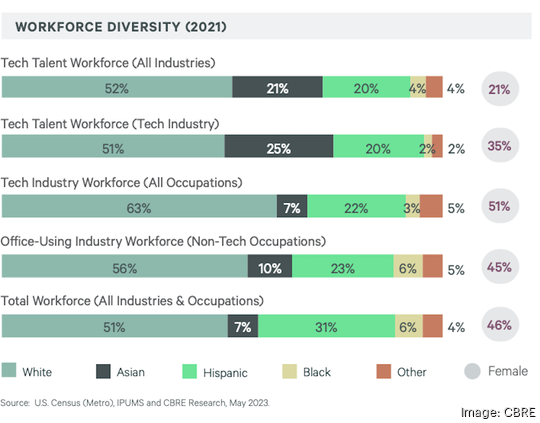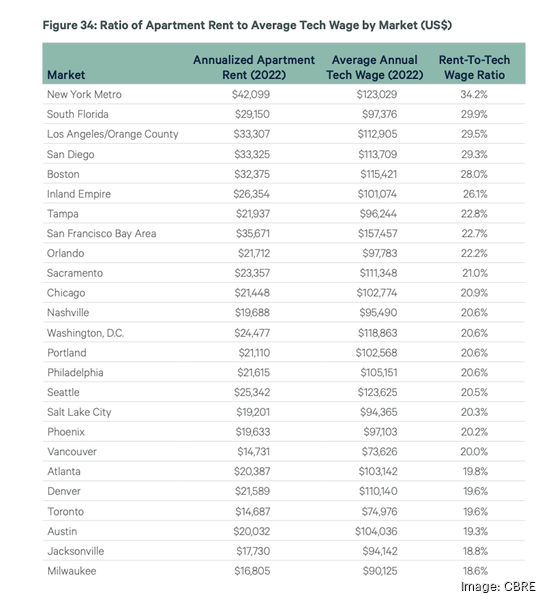
Austin's tech scene is increasingly a population of 30-somethings, many of them drawing salaries of around $104,000. Despite some improvements in diversity and inclusion efforts, they are mostly white and mostly male, according to a new report on tech workforce demographics in the U.S. and Canada.
Perhaps that's not shocking information. But the report by real estate firm CBRE gives an updated look at not only how Austin has changed in recent years but how it compares to other tech hubs, from Seattle to Miami to New York City.
CBRE ranked Austin No. 6 overall among the top 50 markets and No. 5 in the United States for the overall strength of its tech talent, based on 13 metrics meant to gauge a location's depth, vitality and attractiveness to companies. Austin came in behind the San Francisco Bay Area, Seattle, New York City, Washington D.C. and Toronto and ahead of Boston.
Austin's ranking was unchanged from 2022.
Among the highlights of the new report:
- Austin ranks No. 3 for the highest concentration of software engineers, trailing only the Bay Area and Seattle.
- Austin also ranks No. 3 for the highest concentration of tech talent within the core tech industry, topped only by the Bay Area and Seattle.
- Local tech workers earn an average salary of $104,000, up 18% from five years ago. The highest paying role is computer and IT systems manager, with an average salary of $164,770.
- Austin has the nation's highest growth rate of tech workers in their 30s, with a 52% increase from 2016 to 2021.
Diversity remains a major shortcoming. About 4% of the tech workforce, which includes people in tech roles at both tech and non-tech companies, is Black — Austin as a whole is roughly 7% Black. Meanwhile, about 20% of tech workers identify as Hispanic, while the city at large is 32% Hispanic. The report also indicates that 21% of tech workers are women.

The diversity figures don't put Austin at the top or bottom of the list — South Florida, San Antonio and Houston have the most diverse tech workforces and Madison, Wisconsin; Cincinnati and Detroit are among the least. Rather, the diversity stats show that underrepresentation in Austin is pretty close to the historical norm in the United States.
"Hispanics, Blacks and females were underrepresented in both tech talent occupations and the tech industry," the report said. "These underrepresented groups were also concentrated in the lower-wage brackets."
While Austin is an increasingly expensive place to live, it ranked No. 11 in terms of 2022 operating costs. The CBRE data show local companies spend on average $52.1 million a year: $49 million on talent and $3 million on office rent. That's based on a typical 500-person tech company with 60,000 square feet of office space. The lowest cost markets were all in Canada.
The report showed Austin office rent rates increased 20% from Q1 2020 to Q4 2022, when annual gross direct asking rent per square foot was $47.62. Comparatively, the Bay Area was $69.79 and Seattle was $44.89 per square foot.

This year's report shows that tech companies have been shedding jobs, often in sales. But small- and medium-sized non-tech businesses have been scooping up a lot of that talent as technology becomes a bigger piece of many industries.
"Tech talent remains in high demand despite economic uncertainty and employment reductions," the report said. "Remote and hybrid work will benefit tech talent employers and challenge some office markets with reduced demand."







